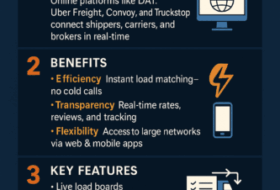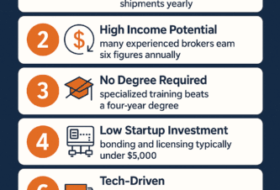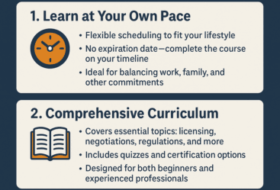Freight Broker Training Course: Learn how to become a freight broker with our comprehensive online course
If you’re interested in starting a career as a freight broker, you’ve come to the right place. In this article, we’ll provide you with a step-by-step guide on how to become a freight broker and highlight the importance of enrolling in a comprehensive freight broker course.
What is a freight broker?
A freight broker is a professional who acts as an intermediary between shippers and carriers. Their primary responsibility is to match shippers with carriers who can transport their goods efficiently and cost-effectively.
How to become a freight broker
Here are the steps to follow to become a freight broker:
Step 1: Register for a freight broker authority
To operate as a freight broker, you must register for a freight broker authority with the Federal Motor Carrier Safety Administration (FMCSA). This involves submitting an application, paying a fee, and obtaining a USDOT number.
Step 2: Obtain a surety bond
As part of the registration process, you must obtain a surety bond of at least $75,000. The surety bond ensures that you’ll comply with FMCSA regulations and pay carriers promptly for their services.
Step 3: Apply for a license and insurance
You must obtain a license and insurance to operate as a freight broker. The license requirements vary by state, so check with your state’s Department of Transportation for details. You’ll also need liability and cargo insurance to protect your business and your clients’ goods.
Step 4: Understand the FMCSA regulations
As a freight broker, you must comply with FMCSA regulations, which include record-keeping, reporting, and financial responsibility requirements. You must also understand the legal and ethical standards of the industry.
Step 5: Build a network of shippers and carriers
To be successful as a freight broker, you must build a strong network of shippers and carriers. This involves reaching out to potential clients and building strong relationships with them. You must also establish connections with reliable carriers who can transport the goods efficiently and cost-effectively.
Importance of a freight broker course
While it’s possible to become a freight broker by following the steps mentioned above, enrolling in a comprehensive freight broker course can make the process easier and more efficient. A freight broker course can provide you with the knowledge and skills required to excel in the field.
Advantages of a freight broker course
A freight broker course can provide you with a comprehensive understanding of the transportation industry and the role of a freight broker. You’ll learn about the regulations and requirements, negotiation and communication skills, and the business aspects of being a freight broker.
Types of freight broker courses
There are several types of freight broker courses available, including online courses, in-person courses, and hybrid courses. Online courses are convenient and flexible, while in-person courses provide more hands-on training. Hybrid courses combine both online and in-person training.
Key features of a comprehensive freight broker course
A comprehensive freight broker course should cover all the essential topics, including the FMCSA regulations, negotiation and communication skills, and the business aspects of being a freight broker. The course should also provide hands-on training and support, including access to industry professionals and resources.
Choosing the right freight broker course
Choosing the right freight broker course is crucial to your success as a freight broker. Here are some factors to consider when selecting a freight broker course:
Accreditation: Ensure that the course is accredited and recognized by industry professionals.
Reputation: Check the course provider’s reputation and reviews from past students.
Course content: Review the course content and ensure that it covers all the essential topics.
Cost: Consider the cost of the course and whether it’s within your budget. Conclusion
In conclusion, becoming a freight broker requires registering for a freight broker authority, obtaining a surety bond, applying for a license and insurance, understanding the FMCSA regulations, and building a network of shippers and carriers. While it’s possible to learn all of this on your own, enrolling in a comprehensive freight broker course can provide you with a competitive advantage and increase your chances of success in the field.
When choosing a freight broker training course, it’s important to consider factors such as accreditation, reputation, course content, and cost. With the right training and resources, you can become a successful freight broker and help shippers and carriers meet their transportation needs.
FAQs Freight Broker Training Course
What is the average salary of a freight broker?
According to the Bureau of Labor Statistics, the median annual salary for freight brokers in the United States is $78,530.
Do I need a degree to become a freight broker?
No, a degree is not required to become a freight broker. However, some employers may prefer candidates with a degree in business or a related field.
How long does it take to become a freight broker?
It can take anywhere from a few weeks to several months to become a freight broker, depending on your experience and the training you receive.
What skills are required to become a successful freight broker?
Some of the essential skills for a freight broker include communication, negotiation, problem-solving, and organizational skills.
Can I operate as a freight broker from home?
Yes, many freight brokers operate from home. However, you’ll need to ensure that you have a reliable internet connection and a quiet workspace to conduct business.








